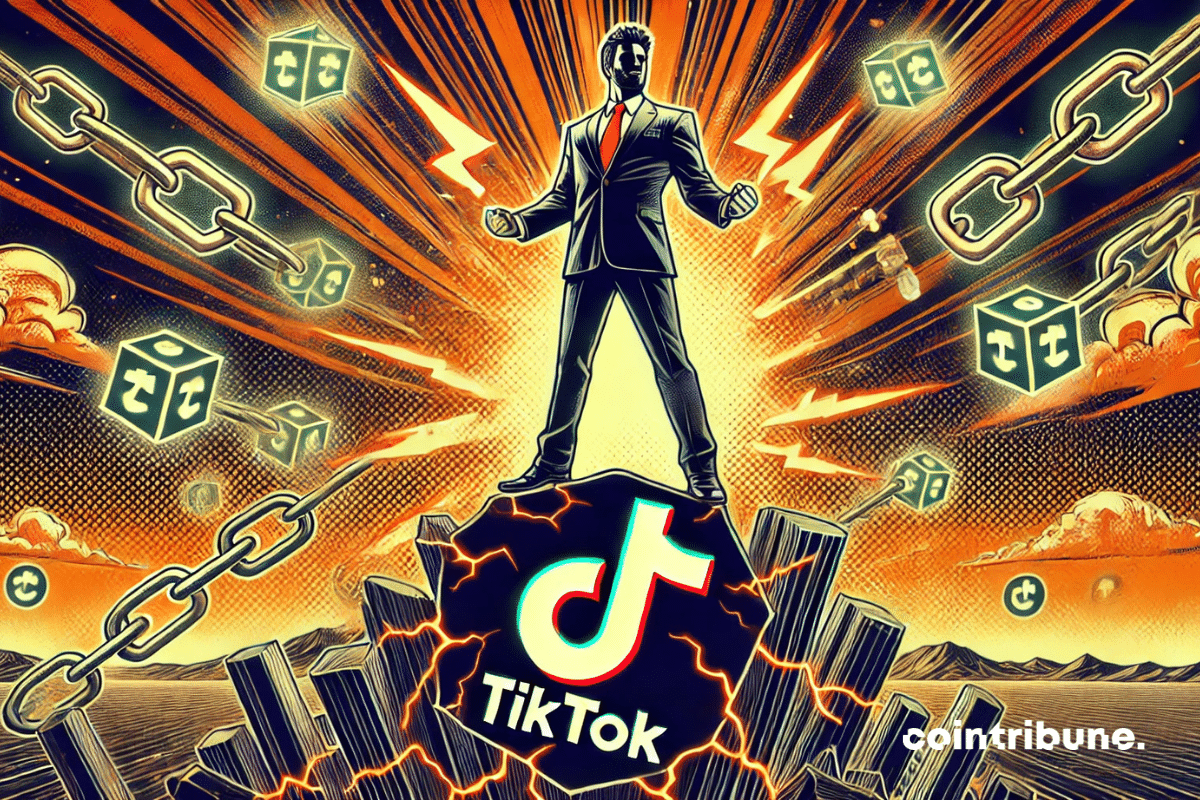Sentiment around Ethereum (ETH) has reached its lowest annual level, according to a recent analysis. This ambient gloom could paradoxically be a positive indicator for investors, who might see ETH explode in the coming days!
Short news
Argentina, already shaken by a persistent economic crisis, now sees its president Javier Milei caught in a judicial storm related to the crypto Libra. While Milei, a champion of libertarianism, promised a monetary revolution, a hastily deleted promotional tweet and opaque transactions have triggered a sensational investigation. Amid speculative surges, suspicions of pump-and-dump schemes, and criminal proceedings, the Libra case reveals the dark corners of a crypto ecosystem in search of credibility.
The flagship cryptocurrency experienced a significant decline following the official signing of the U.S. presidential decree establishing a strategic reserve of Bitcoin. While investors hoped for massive purchases by the government, the reality proved to be less ambitious, causing a market correction.
The crypto ecosystem is going through an expansion cycle where competition among blockchains is intensifying, especially in the decentralized exchanges (DEX) market. Indeed, long dominated by Ethereum, this sector is seeing the emergence of a significant competitor: Solana, whose trading volumes briefly surpassed those of Ethereum in February. This unexpected performance occurred despite an unprecedented crisis in the memecoin segment, these speculative cryptos that have long been a key economic driver of the network. Solana is holding on to its place among the DEX leaders, but the recent collapse of memecoins raises a major question: can the network maintain its position without this asset?
Ethereum is facing a major setback in the development of its upcoming update, Pectra. Following a series of issues that paralyzed the Holesky testnet, Ethereum developers decided to launch a "shadow testnet." Although the outage is not directly related to Pectra, it has nonetheless hindered testing, potentially delaying its deployment which was initially scheduled for early spring.
Anatoly Yakovenko, co-founder of Solana, expressed his skepticism about the idea of a strategic reserve of cryptocurrencies in the United States, fearing for the decentralization of the sector. However, he remains open to objective criteria if such a reserve were to come into existence.
The Trump administration has just taken a new step in the regulation and integration of cryptocurrencies in the United States. President Donald Trump signed a presidential decree late last night that establishes a Strategic Bitcoin Reserve and a Digital Asset Stockpile, an initiative that transforms the American approach to cryptocurrencies.
The integration of tokenized real-world assets (RWA) into decentralized finance (DeFi) opens up new opportunities for investors and borrowers. Credefi, as a DeFi lending platform specialized in financing SMEs and trade, is well positioned to capitalize on this trend and offer attractive returns while mitigating the risks of the crypto market.
On the eve of the Crypto Summit at the White House scheduled for March 7, 2025, World Liberty Financial, a decentralized finance platform linked to the Trump family, has significantly increased its cryptocurrency holdings. According to recent data, the company has injected 25 million dollars into its reserves by acquiring several major cryptocurrencies. What is behind this initiative?
The global economy operates in cycles where fiat currencies play a crucial role in market dynamics. Indeed, the weakening of the US dollar, often seen as an indicator of macroeconomic adjustment, seems this time to open a window of opportunity for cryptocurrencies. According to Raoul Pal, analyst and CEO of Real Vision, the fall of the dollar could be the catalyst for a particularly bullish second quarter in 2025 for bitcoin and the entire crypto market. This optimism is based on historical data and well-established macroeconomic trends. But then, is this situation the signal of a sustainable rally or merely a temporary market reaction?
Michael Saylor dropped some crumbs on the Fox News microphone on the eve of the roundtable organized by the White House with leaders of the crypto community.
The landscape of crypto trading platforms is marked by a diversity of options, each with its own advantages and disadvantages in terms of fees. Comparing these fees is essential today for traders to choose the platform that best meets their needs and investment strategy.
The Financial Markets Authority (AMF) now imposes new fees on licensed crypto service providers in France. This measure, established by decree No. 2025-169 of February 21, 2025, is likely to weigh heavily on a sector that is already heavily regulated by the European MiCA regulation.
Bitcoin, after creating an illusion, falls back into uncertainty. Traders are sweating profusely, caught between vanished hope and growing fear.
On March 5, 2025, major news shakes the crypto world: U.S. Secretary of Commerce, Howard Lutnick, hinted that the Trump administration is preparing to unveil an ambitious strategy concerning a reserve solely of bitcoin. This announcement, scheduled for the inaugural crypto summit at the White House on March 7, is sure to mark a potential turning point in the economic policy of the United States and their approach to digital assets.
The extreme volatility of Bitcoin is resurfacing, fueled by a cocktail of economic uncertainties and government initiatives in the United States. As the crypto market tries to stabilize after a high-tension start to the year, the price of BTC is experiencing violent fluctuations. Within a few days, it peaked at $93,000 before plunging sharply below the $82,000 mark. This dynamic reflects the nervousness of investors in light of two major announcements: the imposition of a 25% tariff by the United States on Canada and Mexico, and Washington's ambition to create a national crypto reserve.
At the heart of a debate as lively as it is surprising, the crypto universe is under the spotlight. The digital revolution and financial freedom clash with the imperatives of national security. This article boldly and clearly explores the issues related to crypto-friendly regulations and the potential excesses of an exacerbated surveillance state.
Ripple, one of the major players in the crypto sector, is once again under the spotlight. While the firm is regularly criticized for its management of the XRP supply, its CTO, David Schwartz, made remarks that are sure to fuel the debate. According to him, Ripple has every right to act in its own interest through the sale of XRP tokens, a claim that raises eyebrows within the community. This statement comes as new elements strengthen the questions surrounding the distribution of XRP. A dormant wallet containing over $7 billion in XRP has been identified, and some massive transfers have been spotted in the markets. Between legitimate financial strategy and market manipulation, the question of the impact of Ripple's sales on the XRP price is more urgent than ever.
In a context of increasing uncertainty in the crypto market, Solana experienced a capital hemorrhage in February 2025. Investors, burnt by scandals related to memecoins and the recent record hack of Bybit, are massively turning to digital assets deemed safer.
Farewell obligations, farewell caution! Ricardo Salinas is casting aside traditional finance and wrapping himself in digital gold. 70% of his empire now rests on bitcoin.
Runbot, an innovative platform aiming to democratize automated crypto trading, is set to make its debut on the blockchain scene with a highly anticipated Initial DEX Offering (IDO) fundraising event this week. With the Token Generation Event scheduled for March 10, 2025, at 1:00 PM UTC, this announcement marks a key milestone for the project, which will be supported by several renowned launchpads.
The financial landscape of Bitcoin is undergoing a silent transformation. Blockstream, a giant in blockchain infrastructure, has just unveiled an initiative that could rewrite the rules of institutional credit. With three funds totaling several billion dollars, the company is opening an unprecedented breach: transforming Bitcoin into liquid leverage without requiring its sale. A bold move that places BTC holders at the center of a parallel financial system, where digital gold finally becomes a productive asset.
Alexis Ohanian, co-founder of Reddit, has confirmed his intention to participate in the acquisition of TikTok's U.S. operations to transform it into a blockchain-based platform. This initiative comes in the context of the Chinese application facing a potential ban in the United States under the Trump administration.
As the crypto market goes through a turbulent period, an unexpected asset is drawing all the attention. In an environment marked by widespread losses, Pi Network has just dethroned Hedera (HBAR) in market capitalization, rising to 11th place in the crypto rankings. This turnaround raises questions, both about the drivers of this ascent and the sustainability of the phenomenon. Amid the collapse of giants like Bitcoin, Ethereum, and Solana, how is Pi Coin managing to show gains?
On March 5, 2025, the highly anticipated Ethereum upgrade, named "Pectra", reached a crucial milestone with its successful deployment on the Sepolia test network. This advancement brings the Ethereum community closer to the integration of Pectra on the main network, marking a major evolution since the last update in 2024.
In an unprecedented financial showdown, El Salvador is going all-in on the global chessboard. Despite warnings from the IMF and a $1.4 billion conditional loan, Nayib Bukele persists: the country continues to buy more and more bitcoins. A risky bet, but a bet that is embraced.
On March 7th, the White House will host a historic summit bringing together the biggest names in the crypto industry. This event, orchestrated by David Sacks, could mark a decisive turning point for the future of cryptocurrencies in the United States.
On March 6, 2025, Solana validators will vote on two major proposals aimed at modifying the network's economy and the reward system for stakers. These proposals, known as Solana Improvement Documents (SIMDs), are generating intense debate within the crypto community, particularly due to their impact on validator revenues, which are set to decrease dramatically.
The euphoria of the last few weeks has abruptly transformed into a debacle for crypto investors. In just 24 hours, over a billion dollars worth of positions were liquidated, taking with them the hopes of a prolonged market rebound. At the heart of this shock is a new wave of economic uncertainties, amplified by the United States' decision to impose 25% tariffs on Canada and Mexico. This announcement triggered a sudden drop in traditional markets, as well as a collapse of Bitcoin and major cryptocurrencies.
Oil markets have been caught off guard. While traders expected a delay in the increase of oil production by OPEC+, the cartel ultimately confirmed that it would return 2.2 million barrels per day to the market starting in April. This decision immediately triggered a brutal price reaction: Brent crude fell to $70.60, its lowest level in five months. This strategic choice, which comes after several successive delays, profoundly alters the balance of supply and demand in an already uncertain economic context.





























